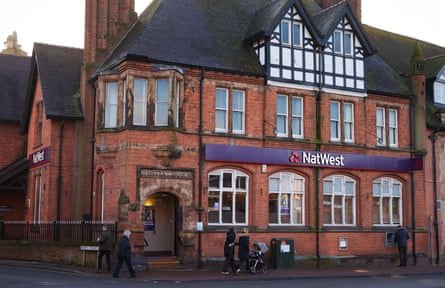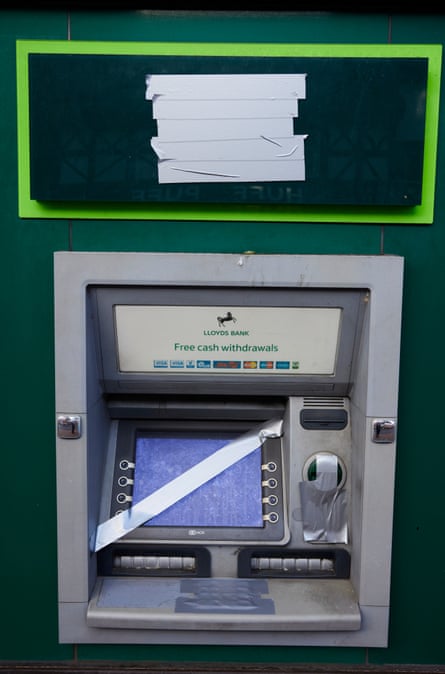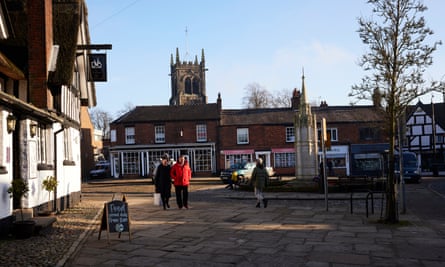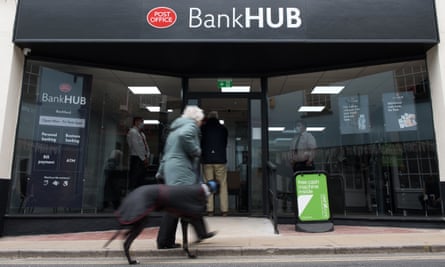“I’ve been with them since I left school. I’m really sad it’s going – where do we go now?”
An older couple who have lived in the Cheshire market town of Sandbach their whole lives are talking about how the imminent loss of its last bank will affect those who struggle to use online banking services, as well as the town’s shops, cafes and businesses.
Sandbach will lose its final bank branch on 8 February when the local NatWest closes, following in the footsteps of Lloyds, which shut its doors for the final time on 5 December last year.
Thousands of UK bank branches have closed over the past few years, meaning some towns and suburbs no longer have a single branch, leaving people and businesses fearful of the impact on vulnerable people and the local economy.
Yet recent research has indicated that cost of living pressures are pushing up the number of customers relying on bank branches to help them manage their squeezed budgets – often because they want to speak to a real person about their finances.

The woman, who declined to give her name, tells us she has banked with NatWest for decades, adding: “It’s been there for donkey’s years.”
Her husband adds: “I’m old-fashioned, I’m old style – I like to go in and shake someone’s hand. It’s a bit impersonal doing it online, and, being old, you get worried about fraud.
“The other thing is, we haven’t got a computer, so how do you do it?”
He also says it is “sad for the town that another building will be gone – it will probably become a charity shop or a cafe”.
After NatWest’s departure, the closest bank will be about five miles away in Crewe, with some banking services provided by the town’s post office and Nationwide building society, although the latter doesn’t do small business banking.
It’s a cold Monday morning in January and there’s a steady stream of shoppers browsing the windows of Sandbach’s independent businesses, stopping to take cash out at NatWest’s ATM, popping into Nationwide and sitting in the cafes on the high street.
Tony Bird, who runs Birds Traditional Butchers in the town, says the closure of the final bank branch will be inconvenient for local businesses because of “the extra time involved … standing there at the post office waiting to get change, or having to drive farther afield”.
Going to Crewe will take “easily an hour out of the day … It will affect all businesses, not just us. There are a lot of elderly people here as well,” he says.
“We can’t afford that time to go travelling elsewhere. Every week we have to go and get change – it’s just the inconvenience more than anything. When you have banks on your doorstep, it’s not a big deal – I could just nip out.”
A woman who works in the town says her company had even “considered an office move” because of the inconvenience but had decided to stay put for now.
Businesses are also concerned about a possible drop in footfall if Sandbach residents, and people who live in neighbouring villages, go elsewhere for their banking.
“We’ve noticed there’s not so many people out. They might go somewhere else, into Crewe and Manchester. And then everyone will moan when there are no shops left,” Bird says.
“Customers say they come into town to go to the bank, and then go round the shops,” a member of staff at Sunflowers gift shop tells us.
During the past few months, a string of banks have announced they are shrinking their networks, arguing that customers are spurning traditional counter services in favour of banking online and via mobile phones.

On Friday, Lloyds Banking Group announced the closure of 18 Halifax branches and 22 Lloyds sites, and in the past few days Barclays has revealed it is axing another 15 branches.
At the end of November, HSBC said it would be shutting a further 114 UK outlets between April and August this year.
The previous month, NatWest said it would be axing a further 43 branches – including the Sandbach one – during the first half of this year.
According to the consumer group Which?, UK banks and building societies have closed, or announced the closure of, 5,355 branches since January 2015, at a rate of about 54 each month. It says the NatWest group will have closed 1,234 branches by the end of 2023, “the most of any banking group”.
Yet in recent months, many households have turned to cash as a budgeting tool in order to stay on top of their spending, and are increasingly withdrawing or paying in money at a branch. The top reason why individuals said the cost of living crisis had made them more likely to visit a branch was so they could meet a bank manager or member of staff to discuss their finances, recent research from the accountancy firm KPMG found.
Local politicians and campaigners in Sandbach are concerned about the impact the lack of banks will have on elderly and vulnerable people, who may be less likely to use online services, and independent businesses in the town and surrounding villages.
Dale Maskell, the chief executive of Age UK Cheshire, says: “Older members of the community in particular will feel the impact of the closure of the last bank in Sandbach. Many rely on in-person banking services and may struggle to access alternative options such as online banking or mobile banking apps.
“The closure also raises concerns about the broader issue of financial accessibility for older people, as many may face barriers such as digital exclusion or health conditions that prevent easy access to financial products and services.”
He adds: “We are keenly aware of the importance of maintaining convenient, safe and affordable access to financial services for older people”.
Age UK has called on the industry to implement a “universal service obligation” on banks to guarantee the provision of the core services required by older people, as well as the expansion of innovations such as “carer’s cards”.
Shared “banking hubs” are being set up, and will fill in some of the gaps where branches have closed.
When a bank branch closes, Link, the UK’s ATM network, identifies whether a town needs further services. In November it confirmed that Sandbach businesses will “receive increased support for depositing cash”, although the town does not qualify for a full banking hub.
The local MP, Fiona Bruce, says Sandbach has a high proportion of older people “who will particularly feel the loss of face-to-face banking in the town”.
Bruce, the Tory MP for Congleton, adds: “I myself banked in Sandbach for almost 35 years until a recent bank closure, and I am keenly aware that the lack of any local bank facilities here, which has such a substantial number of thriving independent small businesses, will be keenly felt by businesspeople and impact on their ability to trade as efficiently and effectively as they would wish.”

NatWest says that between 2019 and 2022, counter transactions at the Sandbach branch decreased by 51%, and adds that it was used by five personal customers on a regular basis in 2021.
A NatWest spokesperson says: “As with many industries, most of our customers are shifting to mobile and online banking because it’s faster and easier for people to manage their financial lives.
“We understand and recognise that digital solutions aren’t right for everyone or every situation, and that when we close branches we have to make sure no one is left behind. We take our responsibility seriously to support the people who face challenges in moving online, so we are investing to provide them with support and alternatives that work for them.”
‘Banking hubs’ scheme aims to help those hit by branch closures

Help is on the way for some of the communities left high and dry by bank branch closures.
More shared “banking hubs” are to be rolled out across the UK to help people living in towns that have lost branches or ATMs have continued access to cash, it emerged this week.
A banking hub is a shared service that operates in a similar way to a standard branch, with a counter service run by Post Office staff where customers of almost any bank can withdraw and pay in cash, pay bills and carry out regular transactions. There are also private spaces where customers can speak to someone, with trained specialists from different banks available on different days.
So far, four hubs are open – in Rochford, Essex; Cambuslang, on the edge of Glasgow; Brixham in Devon; and Cottingham, east Yorkshire – with a further 27 on the way.
Meanwhile, some communities that are not eligible for a hub – including Sandbach – will qualify for new “deposit services” designed to help shops and other businesses that would otherwise have nowhere local to bank their takings.
At the moment, 28 locations around the country are likely to receive increased support when it comes to depositing cash. The plan is that these deposit services will enable consumers and small businesses to bank their cash safely, securely and privately – but it is not entirely clear what they will look like, and none have been set up to date. Some will feel they are definitely no substitute for proper branches.

Under an agreement reached with banks in 2021, the ATM operator Link assesses every area after a branch closure to decide whether it needs additional cash services. This assessment looks at things such as the size of the population, how many shops are there and what else is available locally – for example, are there any ATMs, post offices and retailers offering cashback?
Members of the public, community groups and elected officials can also request a review by visiting link.co.uk/consumers/request-access-to-cash/.
The Lincolnshire town of Barton-upon-Humber was recently named as the first location that will be getting a banking hub after a community request.
It is understood, though, that one problem that needs ironing out is that competition rules mean some locations will not be eligible for a hub because of the presence of a player such as Nationwide, even though Nationwide, Britain’s biggest building society, does not offer small business banking. As things stand, a town that has no banks but does have a Nationwide would have to wait for the latter to close before it could be eligible for a full banking hub, which is clearly something that needs to be changed.
Rupert Jones
